Related Research Articles
A casino is a facility for certain types of gambling. Casinos are often built near or combined with hotels, resorts, restaurants, retail shopping, cruise ships, and other tourist attractions. Some casinos are also known for hosting live entertainment, such as stand-up comedy, concerts, and sports.

Baccarat or baccara is a card game played at casinos. It is a comparing card game played between two hands, the "player" and the "banker". Each baccarat coup has three possible outcomes: "player", "banker", and "tie". There are three popular variants of the game: punto banco, baccarat chemin de fer, and baccarat banque. In punto banco, each player's moves are forced by the cards the player is dealt. In baccarat chemin de fer and baccarat banque, by contrast, both players can make choices. The winning odds are in favour of the bank, with a house edge of at least 1 percent.

A payphone is typically a coin-operated public telephone, often located in a telephone booth or in high-traffic outdoor areas, with prepayment by inserting money or by billing a credit or debit card, or a telephone card. Prepaid calling cards also facilitate establishing a call by first calling the provided toll-free telephone number, entering the card account number and PIN, then the desired telephone number. An equipment usage fee may be charged as additional units, minutes or tariff fee to the collect/third-party, debit, credit, telephone or prepaid calling card when used at payphones. By agreement with the landlord, either the phone company pays rent for the location and keeps the revenue, or the landlord pays rent for the phone and shares the revenue.

A telephone booth, telephone kiosk, telephone call box, telephone box or public call box is a tiny structure furnished with a payphone and designed for a telephone user's convenience; usually the user steps into the booth and closes the booth door while using the payphone inside.

Crown Melbourne is a casino and resort located on the south bank of the Yarra River, in Melbourne, Australia. Crown Casino is a unit of Crown Limited, and the first casino of the now-international Crown brand.

Foxwoods Resort Casino is a hotel and casino complex owned and operated by the Mashantucket Pequot Tribal Nation on their reservation located in Ledyard, Connecticut. Including six casinos, the resort covers an area of 9,000,000 sq ft (840,000 m2). The casinos have more than 250 gaming tables for blackjack, craps, roulette, and poker, and have more than 5,500 slot machines. The casinos also have several restaurants, among them a Hard Rock Cafe. It has been developed since changes in state and federal laws in the late 20th century enabled Native American gaming on the sovereign reservations of federally recognized tribes.

Mohegan Sun is an American casino, owned and operated by the Mohegan Tribe on 240 acres (97 ha) of their reservation, along the banks of the Thames River in Uncasville, Connecticut. It has 364,000 square feet of gambling space.

Digital signage is a segment of electronic signage. Digital displays use technologies such as LCD, LED, projection and e-paper to display digital images, video, web pages, weather data, restaurant menus, or text. They can be found in public spaces, transportation systems, museums, stadiums, retail stores, hotels, restaurants and corporate buildings etc., to provide wayfinding, exhibitions, marketing and outdoor advertising. They are used as a network of electronic displays that are centrally managed and individually addressable for the display of text, animated or video messages for advertising, information, entertainment and merchandising to targeted audiences.

The Star Sydney in Pyrmont, Sydney, is the second largest casino in Australia after Melbourne's Crown Casino. Overlooking Darling Harbour, The Star, owned by Star Entertainment Group features two gaming floors, one bars, 3 restaurants, 351 hotel rooms and 130 serviced and privately owned apartments. It also includes the 2,000 seat Sydney Lyric theatre and 3,000-seat Event Centre. Its gaming operations are overseen and controlled by the New South Wales Casino Control Authority and is licensed to be the only legal casino in New South Wales. In late 2007, it was granted a 12-year extension of its exclusivity and licence.

Massimo Vignelli was an Italian designer who worked in a number of areas including packaging, houseware, furniture, public signage, and showroom design. He was the co-founder of Vignelli Associates, with his wife, Lella. His motto was, "If you can design one thing, you can design everything," which the broad range of his work reflects.
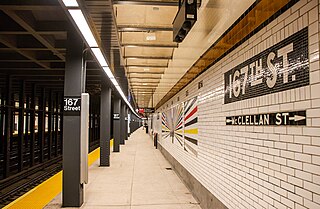
The 167th Street station is a local station on the IND Concourse Line of the New York City Subway. Located at the intersection of 167th Street and Grand Concourse in the Highbridge and Concourse neighborhoods of the Bronx, it is served by the D train at all times except rush hours in peak direction and the B train during rush hours.
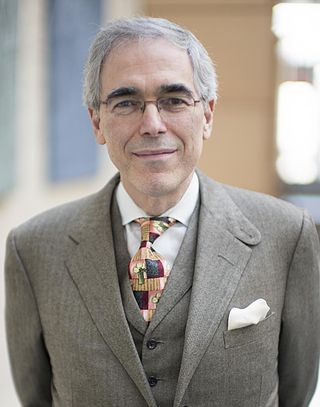
Jay Scott Walker is an American entrepreneur and chairman of Walker Digital, a privately held research and development lab focused on using digital networks to create new business systems. Walker is also curator of TEDMED since 2011, and a founder of Priceline.com and Synapse Group, Inc. In 2000, Forbes estimated his net worth at $1.6 billion. By October 2000, his estimated worth was down to $333 million. As of 2013, he is not on the Forbes list of the world's billionaires.

Established in 1970, Grosvenor Casinos is a UK-based chain of 53 casinos located in major towns and cities across the UK, with two unbranded sister casinos located in Belgium. Grosvenor Casinos is owned by The Rank Group who operate exclusively in the casino, bingo and online gaming industries across Belgium, Spain and the UK.

Hollywood Casino at Penn National Race Course is a thoroughbred horse racing track and casino in Grantville, Pennsylvania, 17 miles (27 km) east of Harrisburg. It is owned by Gaming and Leisure Properties and operated by Penn Entertainment.
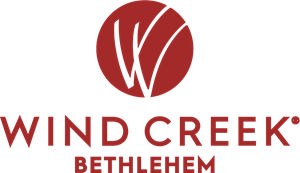
The Wind Creek Bethlehem is a casino hotel located in the Bethlehem Works development site in Bethlehem, Pennsylvania, in the Lehigh Valley region of eastern Pennsylvania. It is owned and operated by Wind Creek Hospitality, an entity of the Poarch Band of Creek Indians.
Titan was an American advertising firm that specialized in out-of-home advertising, headquartered in New York City, New York. A privately held company, it was the largest transit advertising company in North America until a 2015 merger. The company provided services for outdoor advertising on transit vehicles and stations, telephone kiosks, and street banners.
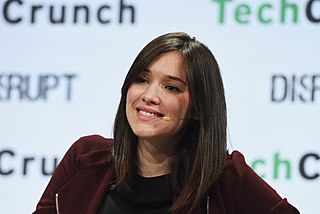
Rachel Haot is an American businesswoman and entrepreneur. She was most recently Executive Director of the Transit Innovation Partnership, a public-private initiative of the Partnership for New York City and the Metropolitan Transportation Authority. Haot was previously the Chief Digital Officer and Deputy Secretary for Technology of New York State for two years. Prior to this role, Rachel served as Chief Digital Officer for the City of New York for three years, from January 2011 to December 2013. She also founded and ran GroundReport between 2006 and 2010.

LinkNYC is the New York City branch of an international infrastructure project to create a network covering several cities with free Wi-Fi service. The office of New York City Mayor Bill de Blasio announced the plan on November 17, 2014, and the installation of the first kiosks, or "Links," started in late 2015. The Links replace the city's network of 9,000 to 13,000 payphones, a contract for which expired in October 2014. The LinkNYC kiosks were devised after the government of New York City held several competitions to replace the payphone system. The most recent competition, in 2014, resulted in the contract being awarded to the CityBridge consortium, which comprises Qualcomm; Titan and Control Group, which now make up Intersection; and Comark.
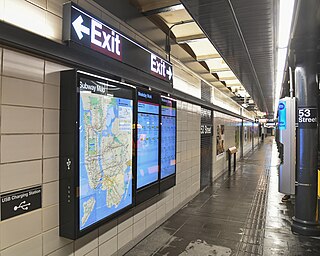
Since the late 20th century, the Metropolitan Transportation Authority has started several projects to maintain and improve the New York City Subway. Some of these projects, such as subway line automation, proposed platform screen doors, the FASTRACK maintenance program, and infrastructural improvements proposed in 2015–2019 Capital Program, contribute toward improving the system's efficiency. Others, such as train-arrival "countdown clocks", "Help Point" station intercoms, "On the Go! Travel Station" passenger kiosks, wireless and cellular network connections in stations, MetroCard fare payment alternatives, and digital ads, are meant to benefit individual passengers. Yet others, including the various methods of subway construction, do not directly impact the passenger interface, but are used to make subway operations efficient.
Intersection is a smart cities technology and out-of-home advertising company. It was formed as a result of a merger between Control Group and Titan in June 2015. Intersection is known for its product LinkNYC.
References
- ↑ "Control Group and Titan Merge to form Intersection" (PDF) (Press release). 23 June 2015. Archived from the original (PDF) on 27 June 2015. Retrieved 26 June 2015.
- ↑ "Control Group and Titan Merge to form Intersection" (PDF) (Press release). 23 June 2015. Archived from the original (PDF) on 27 June 2015. Retrieved 26 June 2015.
- ↑ "Google Startup Aims to Bring Fast, Free Wi-Fi to Cities". Bloomberg. Retrieved 24 June 2015.
- ↑ "Google's Sidewalk Labs is taking over the plan to blanket NYC with free Wi-Fi". The Verge. Retrieved 24 June 2015.
- ↑ "MTA to Add More On the Go! Touch-Screen Travel Stations". Metropolitan Transportation Authority. Retrieved 23 April 2013.
- ↑ Aguilar, Mario (2 April 2013). "The Indestructible Touchscreen Kiosks That Will Take Over New York's Subways". Gizmodo. Retrieved 23 April 2013.
- ↑ Grey, Camilla (8 March 2013). "The Most Ambitious In-Store Retail iPad Integration We've Ever Seen" . Retrieved 23 April 2013.
- 1 2 "Mayor Bloomberg, Chief Information & Innovation Officer Merchant and Chief Digital Officer Haot announce winning prototypes from the Reinvent Payphones Design Challenge". NYC.gov. Archived from the original on 6 March 2013. Retrieved 23 April 2013.
- ↑ "Walker Digital Table Systems: New Game, Same Rules". Control Group. Retrieved 24 April 2013.
- ↑ Green, Marian (1 May 2010). "Top 20 Most Innovative Gaming Technology Products of 2009". Casino Journal. Archived from the original on 16 March 2012. Retrieved 24 April 2013.
- ↑ Joseph Grima (2009). White House Redux: 123 Ideas for a New White House. Control Group; Storefront for Art & Architecture. ISBN 1499633564.
- ↑ "No. 38 Control Group Inc". Crain's New York. Retrieved 22 April 2013.
- ↑ Miller, Charlie; Gutierrez, P. Damian; O'Donnell, Colin. "Control Group 2013 Retail Technology Survey". Control Group. Retrieved 23 April 2013.